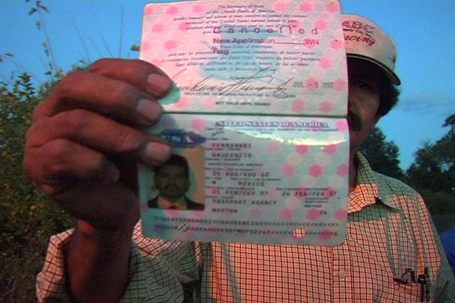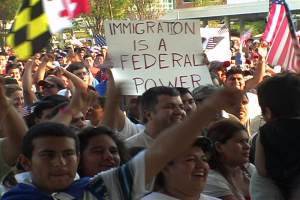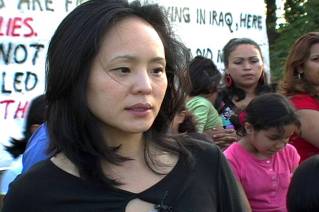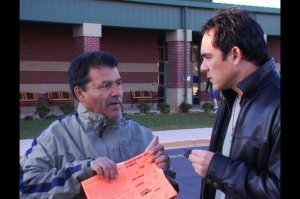De Paisano A Paisano: An Interview with 9500 Liberty’s Eric Byler and Annabel Park
June 14, 2010 at 7:13 pm 11 comments
I had the chance last week to sit down with Eric Byler and Annabel Park, the directors of the new documentary 9500 Liberty that’s now playing across the country. 9500 Liberty outlines the 2007 battle in Prince William County, Virginia, over legislation that legalized racial profiling of “illegal immigrants” and the ways in which that battle polarized the tight-knit community.
I know Eric Byler as the director of Charlotte Sometimes and Tre, two seminal Asian American feature narratives dealing with angsty interpersonal relationships among several Asian Americans, but lately Eric’s been devoting his time and creativity to producing activist shorts. He and Annabel are the instigators of the youtube channel 9500 Liberty, of which the feature doc now in theaters is an offshoot. Both Eric and Annabel are articulate, committed, and smart as a whip, and they’re very passionate about changing the ways that political discourse is conducted in this country. Given the aggravating and idiotic screeds that pass for political expression these days it’s great to talk with thoughtful and creative people who are looking for alternative solutions to some of the tough issues facing the U.S. today.
Here are some excerpts from the almost-hourlong talk I had with them—the full interview can be heard below.
on the dangers of election season
Eric Byler: What we observed in Prince William County is that, in an election season, information is not as important as ammunition, and so people decide what they believe, say and repeat based on whether it helps their side win, not whether it’s true.
I think what certain insurgency tacticians have learned is that, because their positions are so radical and so far outside the mainstream, the only way they can assert their will is to use these tactics that alienate the average American from the political process and shrink participation down to a level that’s easier to manipulate.
So that’s what happened in Prince William County–they organized around deeply negative emotions. By combining racial antagonism with political partisanship they created an environment where only people who really thrive on conflict and who are comfortable with racial tension were going to those board meetings and were daring to speak on these issues.
I think that’s why Annabel and I were so concerned when we saw that become a national political strategy and instead of a blog amplifying the most negative emotions you find an entire news network to amplify not only the most negative emotions but those people they had assembled.
on button-pushing
EB: If you can make the election about some sort of social issue that really pushes emotional buttons–there are too many Mexicans in Arizona is basically the underlying theme of this election—that’s a really polarizing issue. Extreme candidates introduce extreme laws that get extreme reactions that create the kind of political landscape that favors the extreme candidate. So it’s not a surprise. And it always happens a certain number of months before the election because you’re lighting a fuse that’s gonna blow up.
on the use of intimidation tactics
EB: The week before the election (in Prince William County) was the scariest time for us. The racial tension in the county was more palpable than I ever expected to see in this century and I hope I never see again. People would drive by Liberty Wall and throw things at us—people would drive by and yell racial slurs. Those kind of climates are deliberately created for election season. Whether you’re a Democrat or a Republican you can respond really negatively to this kind of politics—we all can be intimidated, we all can be afraid.
on film and the internets as a means of empowerment
EB: Given that there are people who are going to use as a political strategy organizing around the most negative emotions known to humankind then what we have to do is to populate our democracy with people who are willing to be responsible and fact-based and solutions-oriented. That’s what the Coffee Party and 9500 Liberty both seek to do is enlist those people who might otherwise be intimidated into silence because of these kinds of tactics and show them two examples of people who are prepared to engage even in a political process that’s been mightily toxified and frightfully polarized, because we have that much at stake, and to convince them that they have something at stake.
on hearing the news of the anti-immigrant laws in Arizona
Annabel Park: I got really emotional—I started crying! It was almost like a flashback to northern Virginia 2007. It was traumatic!
EB: It’s just such an unnecessary tragedy—the economic hardship that this kind of policy caused, the social toxification, the damage to public safety, was all so unnecessary, and really the only ones who benefit are very extreme politicians who cater to a really tiny fraction of out population.
on creating a more civil political discourse
AP: Politics is about us making collective decisions, and democracy is a method for making collective decisions–it’s not meant to be a fight with two sides. It’s supposed to be a situation where we thrive on differences and diversity but we need to be able to talk to one another. We have to create opportunities for people to talk to one another. That’s the first step in a democracy, that open dialogue—it has to be civil, there has to be real information exchanged. In a way it’s a very simple thing—asking people to protect and practice democracy, and by using social media, to create not only a communication network but by having this idea go viral—let’s go viral with this idea that we have to participate in democracy, and to give them portals for doing it.
on making a difference
AP: The (9500 Liberty) youtube channel did have impact on the community. We just showed (the movie) in Phoenix and in parts of Arizona and I think we made some progress there. I think there are people who are now ready to have dialogue at least. Just saying “Illegal Is Illegal” is just not really a starting point for dialog. It doesn’t help us formulate policy, it’s just grandstanding—it shuts down conversation.
on optimism and inevitability
EB: I feel very optimistic. 9500 Liberty is a microcosm of what’s happening in Arizona and Arizona is a microcosm of what’s happening across the country. The reason why we’re seeing these insurgency tactics, these desperation tactics coming from the right is that they’re afraid of the changes that really are inevitable. They feel that they’re actually delaying those changes by using these extreme tactics but I believe they’re actually accelerating these changes.
Every year another crop of kids turn 18 and registers to vote and during that same time unfortunately we have to say goodbye to our grandparents and aunts and uncles who grew up during the pre-civil rights era and who aren’t really as comfortable with the 21st century as those of us who are younger. So these kinds of cultural issues where a group of very extreme politicians are asking us to hate another group more than they love our country, are gonna cease to be effective, and that’s really when this will stop, when it can be shown, and maybe it will be in November, that this kind of fear politics is not effective.
on the relationship between love stories and political activism
EB: Both Tre and Charlotte Sometimes are essentially love stories where I made the choice to cast both mixed race and full-blooded Asian Americans. And I didn’t realize it but, because it’s an identity issue and identity is very much something that informs my artistic choices, for me it became a political choice. As Annabel likes to say, politics and identity are essentially the same thing.
Eventually I had to become comfortable talking about politics because I was talking about race and identity, and so the transition isn’t as unexpected or as dramatic as you might expect. Identity issues are at the core of American politics right now.
The short answer is I think I decided that in this era of American history, when so many important decisions are being made that are going to affect the rest of this century, that just making love stories, albeit love stories that do have social and political commentary, was not enough of a contribution—I wanted to do more.
(Now) I feel like I could make a movie about Weimar Germany. I could do one of those futuristic movies about a war. I now know what it feels like when you have politicians laying the groundwork for war and you have agitators essentially systematically dehumanizing a population so they can directly take action against them
on “looking illegal”
EB: I think that in some ways Asian Americans were given a pass on this issue in a weird way, even though many Asian Americans are undocumented—it’s a culture war directed at Latinos, let’s face it. And so I’m the one that actually looks Latino (laughs), being the halfer–
During that time, everything was about looking around and trying to figure out who looks illegal–the police are now being directed to try to tell who looks illegal, the government is basing policy on who looks illegal and who citizens say are illegal, because they went to the emergency room and saw a lot of Latinos—so they must’ve been illegal! So everything’s about who looks illegal– And y’know, some days I wake up I look more “ethnic” and my hair’s messy or curly or something. When you live in a climate like that you wake up in the morning and you see yourself in the mirror and you say, “Oh my god—I look illegal today!”
on the role of film and participation politics
AP: Being filmmakers doesn’t give us a special status not any more than being elected gives us a special status. We all have to be part of this democratic process or it’s just gonna fail. To me that one thing that’s a given—if people don’t participate it’s not a democracy.
There are enough people who have been silent who now have an opportunity to say, “Y’know what, I don’t want to be silent any more, I’m sick of this, enough is enough, let’s come together as a community, let’s stop being Democrats and Republicans and start being Americans and figure out what we have in common and have some of these tough conversations about our future. How much money are we spending on the military? How long can we sustain these two wars? What does it mean to be an American at this point? What unites us as a people in a meaningful way beyond the fact that we live in the same land mass?
on the dire need for civility and the role of the Coffee Party
AP: We’ve got to leave our ideology aside in order to come together. Otherwise you’re submitting to these forces that are in every society that want divide people and separate and secede and balkanize—that’s always there. If we don’t step up and counter that with the force of unity and peace and harmony then we’re headed for a very, very bleak future.
With the rise of the Tea Party there was this narrative that the Tea Party represented America, and there’s a lot of frustration with the government, but their point of view is not representative of America. To me it’s a marginalized view of minorities who know how to engage in political theater.
What happened with the Coffee Party is that I started this fanpage on facebook that just exploded. We want to find another way of engaging. We have these problems but I don’t want to be out there denouncing the government or Obama.
I want to be out there trying to figure out how to improve the government and to feel like we’re on the right path so that ordinary people are being represented and we’re on the path to not destroy one another but to work together.
So people are sort of just self-organizing—we have local chapters across the country. In the Bay Area there’s a cluster of them that are very active—in LA, too. There are local chapters–they function largely autonomously. We have national campaigns—like we’re having one right now where we ask people to discuss campaign finance and corporate personhood.
We’re trying to give people ways of connecting to the political process that isn’t alienating, isn’t negative, it isn’t about fighting people but it’s about dialogue and bringing people together–and really insisting on civility.
I don’t know how true this is but I’ve heard people say that people in the Tea Party, it’s had an impact on them. They’ve been much more conscious of their tactics and whether or not they’re going to be judged as being uncivil or not. I think I just like having civility become a viral idea.
Are we gonna being screaming at our politicians and at each other, or are we gonna say, “Okay, we need reform–how do we get there? Let’s work together.”
9500 Liberty (81 minutes)
Co-Directed by Eric Byler and Annabel Park
UPDATE: 9500 Liberty will have its cable television premiere this month on MTV Networks. It will show on Sunday, September 26th at 8pm (ET/PT) on MTV2, mtvU (MTV’s 24-hour college network), and Tr3s: MTV, Música y Más (formerly MTV Tr3s) as part of Hispanic Heritage Month. You go, Eric & Annabel!
Here’s the extended trailer for the film:
Here’s the full interview (trt: 52 min.)
Entry filed under: activism, movies, politics, Uncategorized. Tags: 9500 liberty, activism, annabel park, asian american film, eric byler, movies, politics.
11 Comments Add your own
Leave a comment
Trackback this post | Subscribe to the comments via RSS Feed





1. ewaffle | June 14, 2010 at 11:25 pm
ewaffle | June 14, 2010 at 11:25 pm
Love the excerpts from the interview with Eric Byler and Annabel Park–a hopeful sign that there are still people who think civility and reason should be part of the political process and political thought.
I watched a bunch of the videos on their Youtube channel which I recommend to everyone. The video embedded above comes up as “not available” on Firefox 3.5.
2. valeriesoe | June 15, 2010 at 12:55 am
valeriesoe | June 15, 2010 at 12:55 am
Thanks, E! I’m hoping to get a working link to the full interview soon. Go see the movie if you can–it’s great! Very thought-provoking and thoughtful.
3. dleedlee | June 15, 2010 at 2:09 pm
dleedlee | June 15, 2010 at 2:09 pm
Thanks, great interview. It’s a complicated topic with many facets to it. Have you seen the Variety write up on the film?
4. valeriesoe | June 16, 2010 at 5:09 am
valeriesoe | June 16, 2010 at 5:09 am
Hi D,
Yes, I read the Variety review on hkmdb.com, of course! This took place near your neck of the woods, didn’t it?
Full interview now posted if you have an hour to spare–
v.
5. dleedlee | June 16, 2010 at 6:02 pm
dleedlee | June 16, 2010 at 6:02 pm
Yes, PW County is one of our outer commuter outposts. More lately, and nearby, day laborer meeting centers are the hot topic in several nearby locations.
WPost
6. dleedlee | June 18, 2010 at 9:23 pm
dleedlee | June 18, 2010 at 9:23 pm
In today’s paper, the County Chairman is going to lobby the state legislature to try and have it pass a law to cover the whole state.
Post article
7. valeriesoe | June 18, 2010 at 11:41 pm
valeriesoe | June 18, 2010 at 11:41 pm
Wow, crazy news from Virginia. Meanwhile, AZ’s law is being challenged in federal court
8. valeriesoe | June 18, 2010 at 11:41 pm
valeriesoe | June 18, 2010 at 11:41 pm
BTW, Iove that Washington Post linky–great to hear a reasoned discussion of the topic from a variety of people.
9. Maureen | June 16, 2010 at 6:11 pm
Maureen | June 16, 2010 at 6:11 pm
There is ALWAYS two sides to every story and the one side was completely left out. Also, bending the truth or eliminating it does’t make this film very credible. It makes it a propaganda film. Do they show how the people that opposed the resolution acted? No. Do they tell about the murders that took place in Prince William County by illegal aliens? I believe it was 5.
To some, this might be about race but to most, it is about the “Rule of Law”! And the whole truth should be forthcoming even in this propaganda film.
10. valeriesoe | June 16, 2010 at 10:28 pm
valeriesoe | June 16, 2010 at 10:28 pm
HI Maureen,
Thanks for the comment. Actually, I think the film did a great job presenting both sides of the argument, since Greg Letiecq gets quite a lot of screen time explaining his point of view. The “truth” depends very much on where you sit, and the film shows several points-of-view throughout.
That said, documentary films don’t have to completely unbiased–unlike journalism, most documentaries have a very strong point of view. To call the film propaganda is to discount the complexity of the issue and the film itself.
Also, the point of the film, I think, is how everyone should be able to speak out and not be afraid or intimidated due to fear tactics propogated by opportunistic politicians trying to get elected. Scapegoating is an old political trick to get folks riled up so that they vote with their emotions and not their intellects and this case is no different.
It’s also nice because it shows several people who identify as Republicans changing their mind and speaking out against the hatemongering that took place during that time.
But the most important things that the filmmakers talk about in the interview is trying to bring civility back to political discourse instead of using buzzwords, paranoia, and fear as motivation. As Annabel Park says, “it isn’t about fighting people but it’s about dialogue and bringing people together–and really insisting on civility.”
11. Robert | June 27, 2010 at 4:20 am
Robert | June 27, 2010 at 4:20 am
Bloomberg and Murdoch leading corporations to support immigration reform.
http://www.apaforprogress.org/bloomberg-leads-us-corporations-and-cities-lobby-immigration-reform